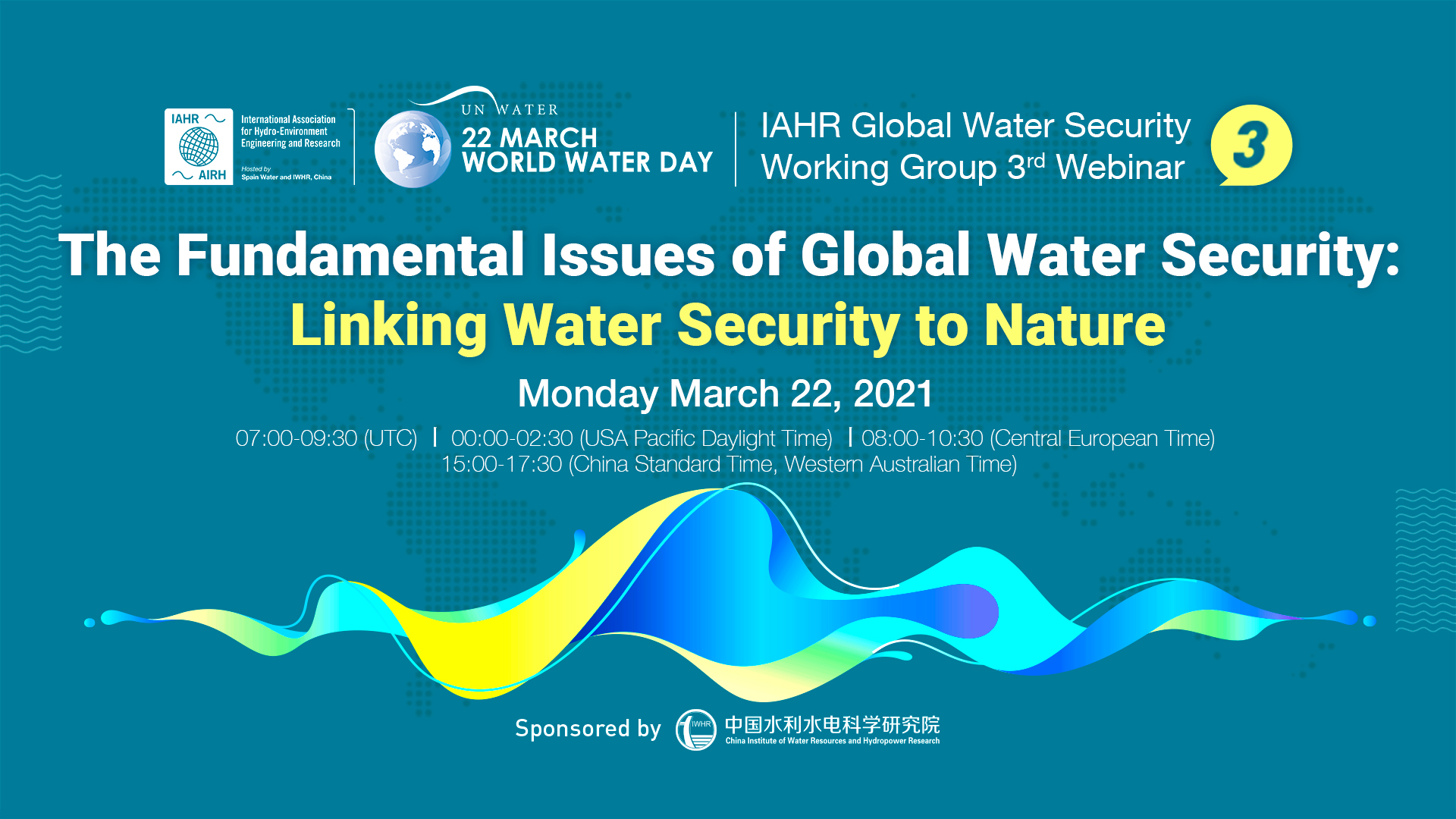IAHR commemorates 2021 World Water Day with a webinar on global water security and its link to nature
To commemorate the 2021 World Water Day, IAHR organized a webinar on March 22 on the “fundamental issues” of global water security (linking water security to nature), which is also the third event following the success of the previous two on the “business” and the “science” of global water security that have attracted a global audience of several thousand page views each. Below is a summary of this online event.

Due to climate change, population growth, increasing urbanisation etc., many lakes, rivers, wetlands and coastal basins globally are becoming more stressed from pollution, depleting water resources, global warming, increased floods and droughts, and increasing ecological and biological disruptions. Whilst practicing water scientists, engineers and managers in regulatory authorities, water companies, consulting and contracting companies, private and public investment bodies and non-governmental organisations are focused on trying to manage water security, there is a growing need to improve water management through more and smarter use of data and nature-based solutions. These approaches were addressed in this webinar, focusing on managing and improving the resources and quality of water in lakes, rivers, wetlands and coastal based systems.
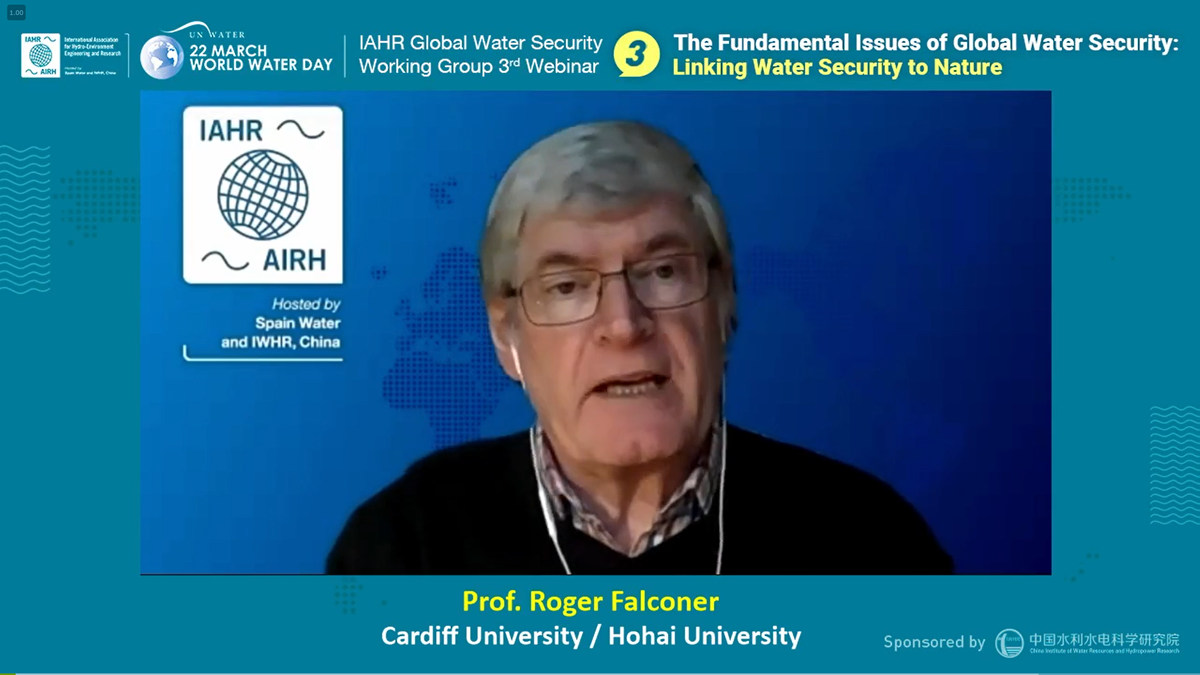
IAHR past president Prof. Roger Falconer, Emeritus Professor at Cardiff University and Chair Professor at Hohai University, opened the webinar with an introduction, in which he briefed on the topics to be discussed, talked about the water-related challenges facing the globe and pointed out “water has reached the center stage of politics now in most countries in the world,” and related this event to the World Water Day, saying “this webinar is particularly timely in the current COVID-19 pandemic crisis, as there are growing concerns globally about the virus potentially being transported through aquatic ecosystems via the complex hydrodynamic processes, typically occurring from source to sea in river basins.”
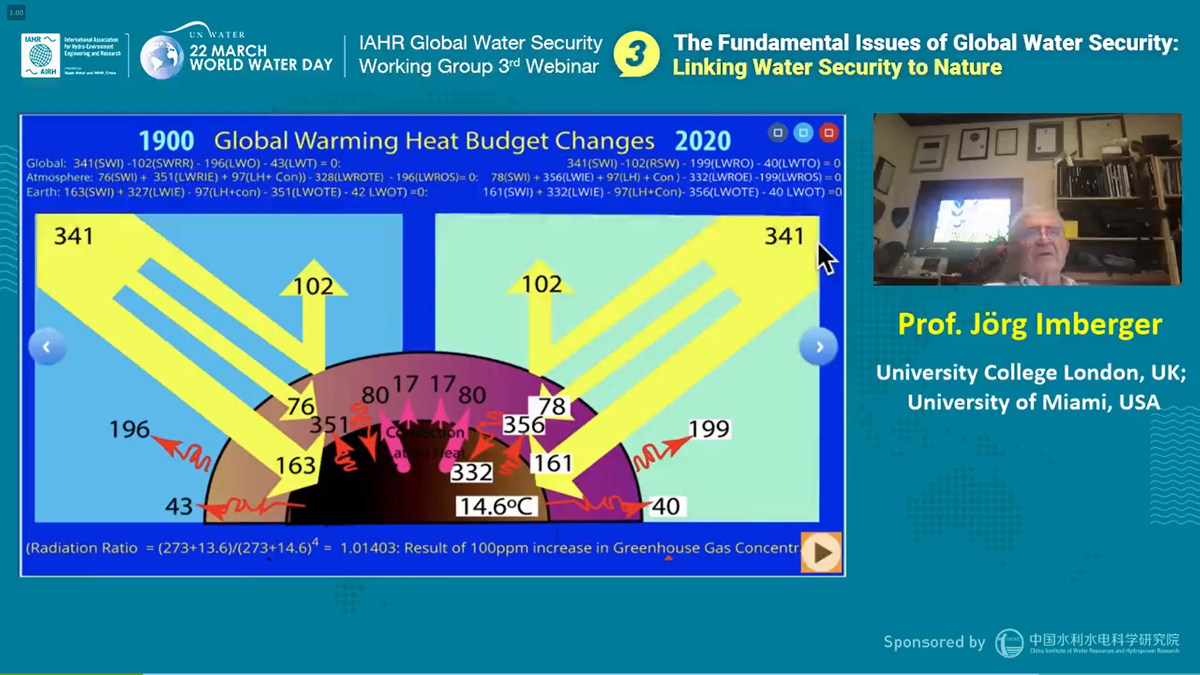
Prof. Jörg Imberger, University College London, UK and University of Miami, USA, gave the first talk titled “Improved Water Security Through Connecting with Nature.” He started with the evolution of human tribal behavior and the changes the way humans communicate, then analyzed in detail the impact of human tribal behaviour and technology and the externalities on atmospheric, terrestrial and ocean ecosystem, and illustrated how best to implement the new adaptive, real-time, self-learning management approach and how to embed the approach into the modern way of human communication with new technologies to change people’s behavior to be better connected to nature. He concluded that getting the community to do the “right” thing requires that every person participates in a “a free education on what nature does for us” and and has access to green places for recreation and exercise ad has “smartphone access to virtual reality engine where they can connect to nature and see the impact of their life style.”
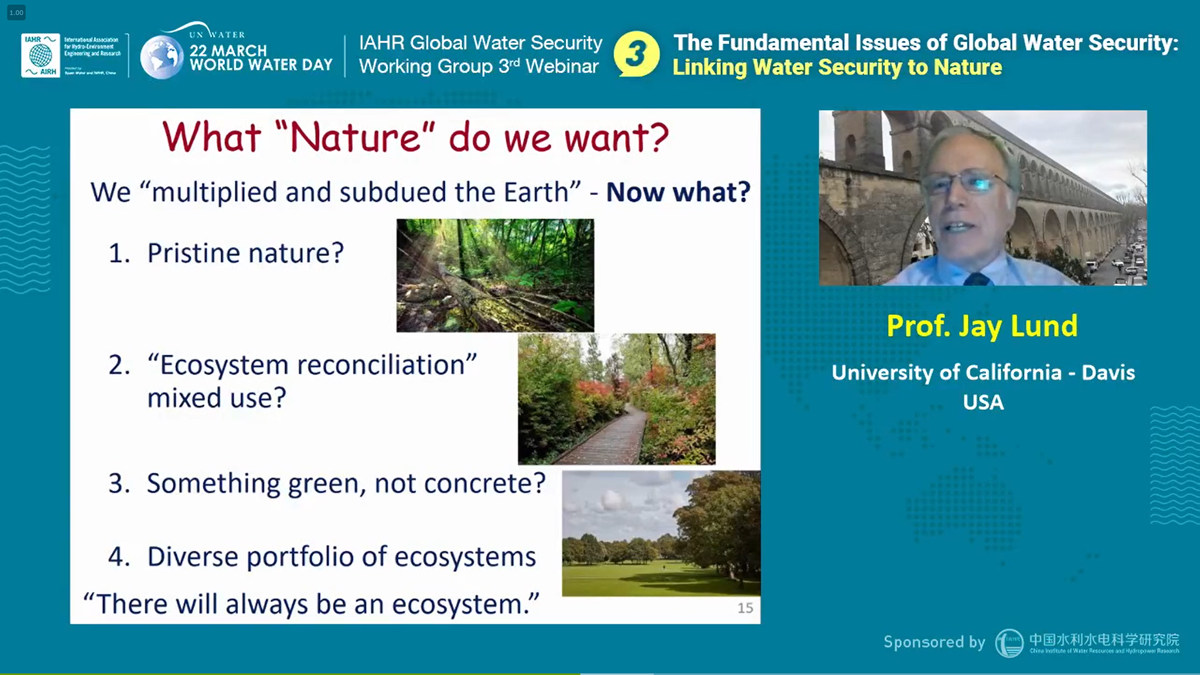
Prof. Jay Lund, University of California – Davis, USA, gave his talk by asking “Can humans and nature both be water-secure?” With a review of the history and current status of water security for both humans and nature, he concluded that 1) Human water security is, and will always be, a problem, but is generally best in history with good prospects; 2) Nature water security was generally good, but today is existentially threatened, and is increasingly a challenge for humans who are responsible for this insecurity; and 3) Nature water security over time should improve eventually but we will lose much of the nature in meantime; and 4) The “ecosystem reconciliation” for nature and humans might be a solution.
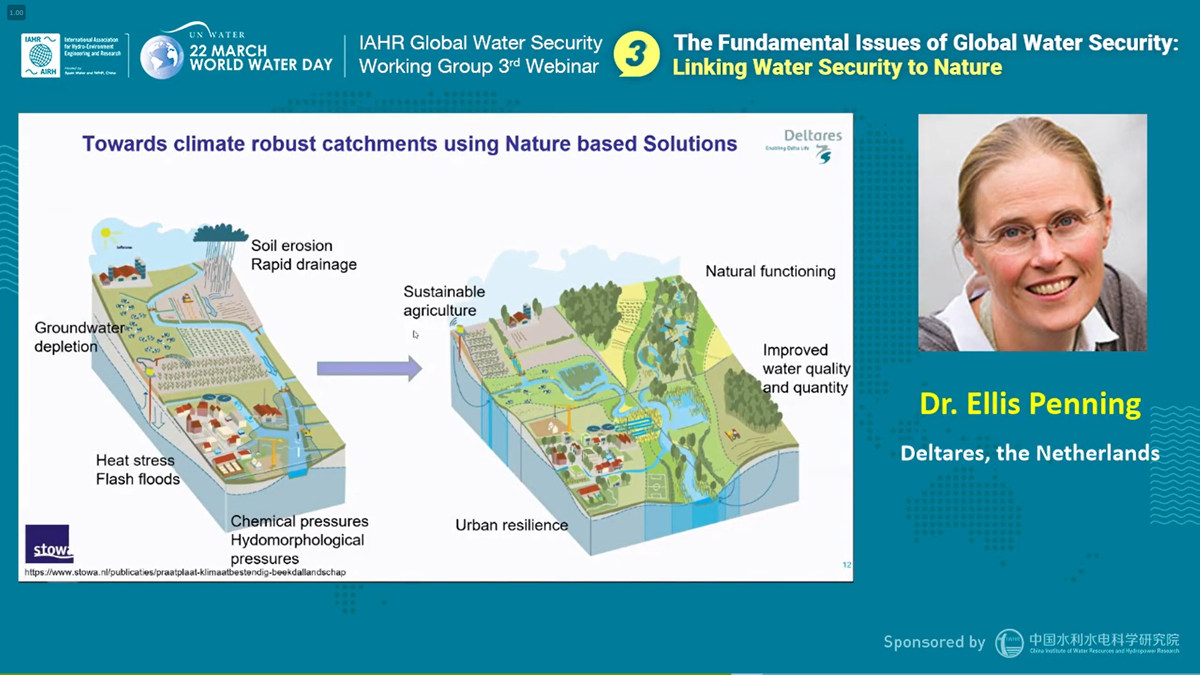
Dr. Ellis Penning, a senior aquatic ecologist of Deltares, Netherlands, gave a talk on “Using Nature-Based Solutions to Address Water Security Challenges.” After mentioning the water security risks of too much, too little and too dirty water, she explained the definition and core of the nature-based solutions, and introduced in detail the approach towards climate robust catchments using Nature-Based Solutions. A case in Indonesia was studied using the four-step method of issue identification, strategy building, implementation, and monitoring and evaluation. Ellis emphasized the importance of tackling uncertainty stemming from incomplete knowledge, learning from the past lessons for future applications, and going wider from only technical knowledge to business case and stakeholder involvement.
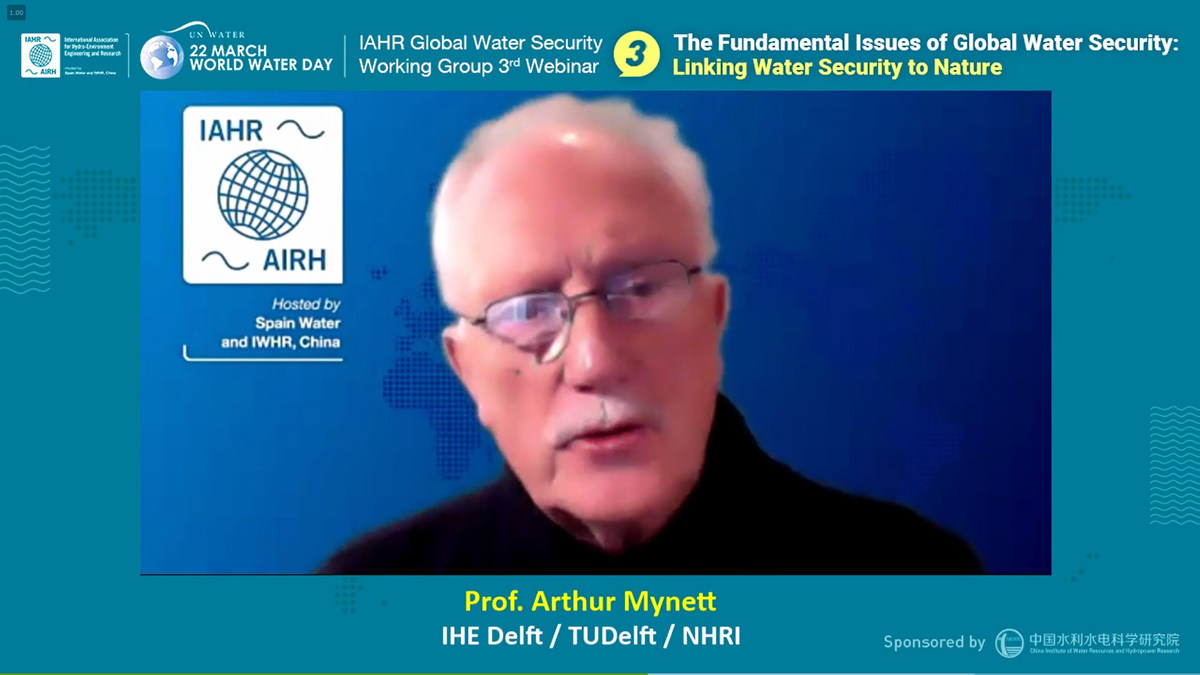
It was estimated more than 1,300 people watched the live-streaming (a lot more have come and are still coming for the playback that was made available in less than 3 hours after the webinar), and participated by posting comments and questions that led to an enlightening discussion. Additional opinions were shared by the three speakers during the Q&A session, which was co-chaired by Prof. Falconer and Prof. Arthur Mynett, Emeritus Professor of both IHE-Delft Institute for Water Education and Delft University of Technology, on the application of nature-based solutions to minimize the risk of global water security, the possibility of losing biodiversity worldwide, the application of reconciled ecosystems in developing countries, climate change as the main driving factor for rapid changes in world ecosystems, the indicators to understand how to implement nature-based solutions and the role of multi-stakeholder approaches, and the transfer of knowledge from indigenous practices in non-western countries.
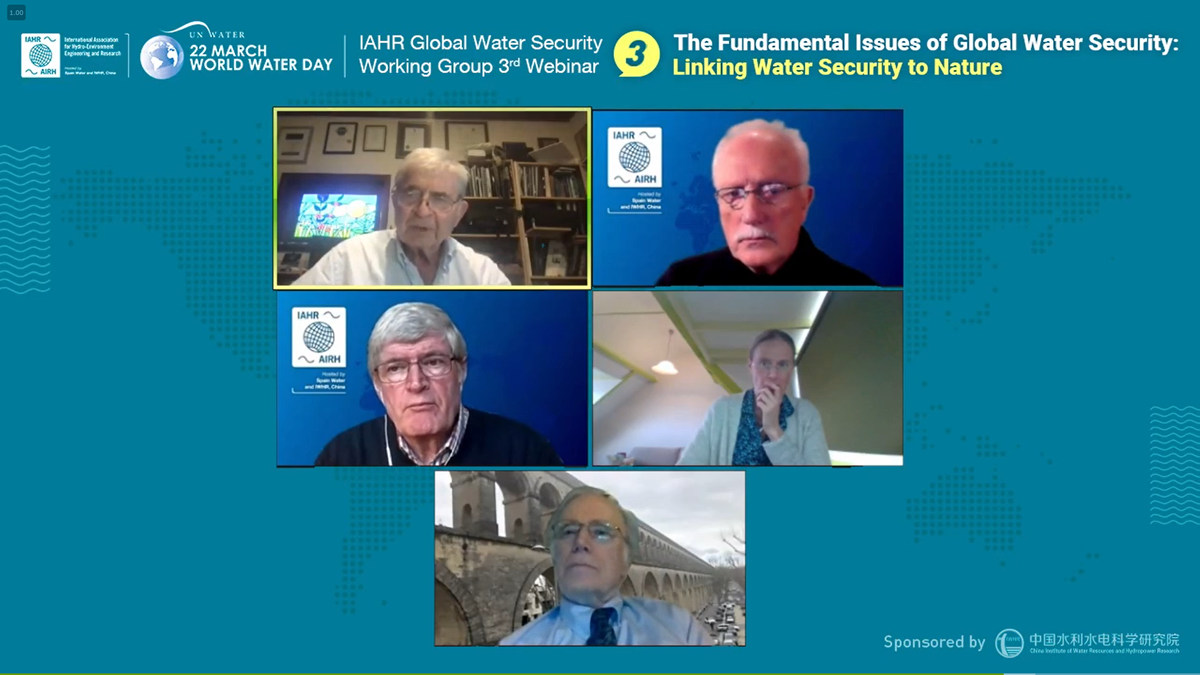
This webinar is sponsored by China Institute of Water Resources and Hydropower Research (IWHR), an IAHR institute member and also the host of one of the two global secretariat offices of IAHR, and co-sponsored by Water and Environmental Engineering Group, Nanjing Hydraulic Research Institute, HR Wallingford, Chinese Society for Hydropower Engineering, IAHR China Chapter, Instituto Nacional de Hidraulica, and China Three Gorges Corporation, all the respected institute members of IAHR.
The role of IAHR, a multi-disciplinary organization with water scientists, engineers and managers in regulatory authorities, water companies, private and public investment bodies and non-governmental organizations, was also highlighted in attaining sustainable water resources management and improving water management through more and smarter use of data and nature-based solutions.
This series of webinars on global water security have been organized by the IAHR Global Water Security Working Group. The next and fourth event (The Challenges of Global Water Security: Linking Policy to Water Solutions) will also be live-streamed online on June 9, 2021.
For more details about these four webinars, here are the links:
1: Business | 2: Science | 3: Fundamental Issues | 4: Challenges
More previous and upcoming online events can also be found at IAHR Webinars.
Stay tuned with IAHR.
